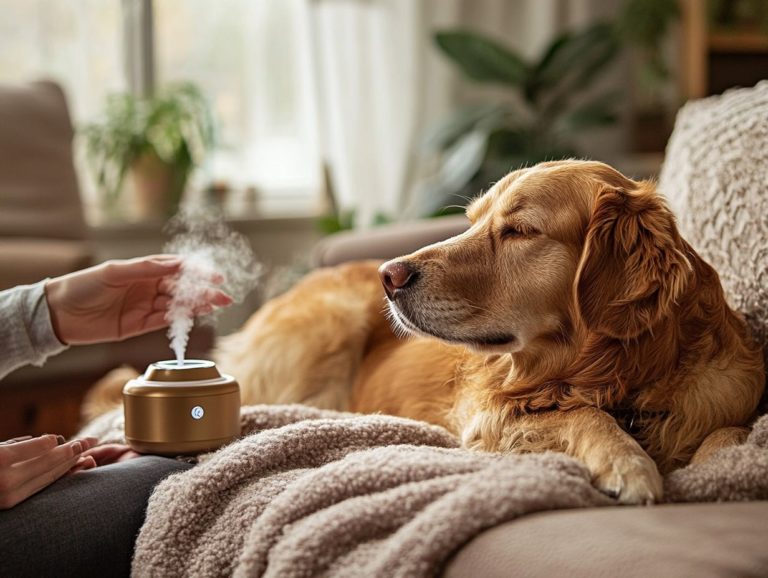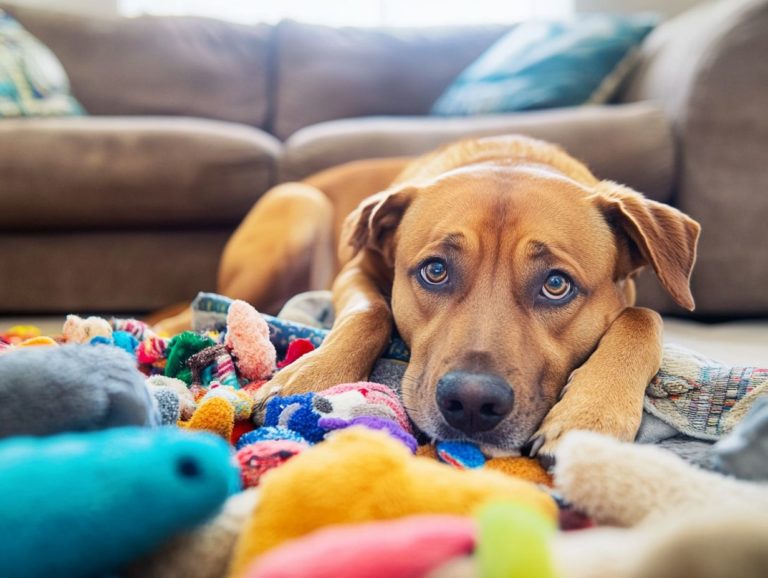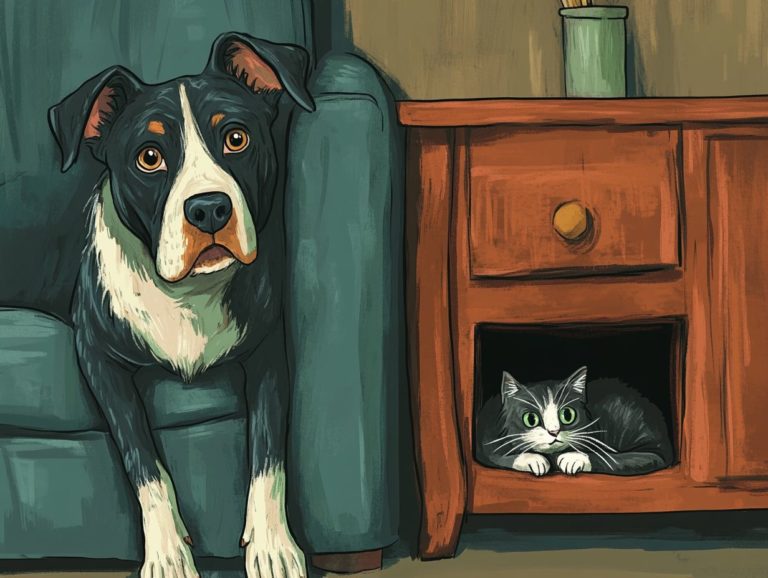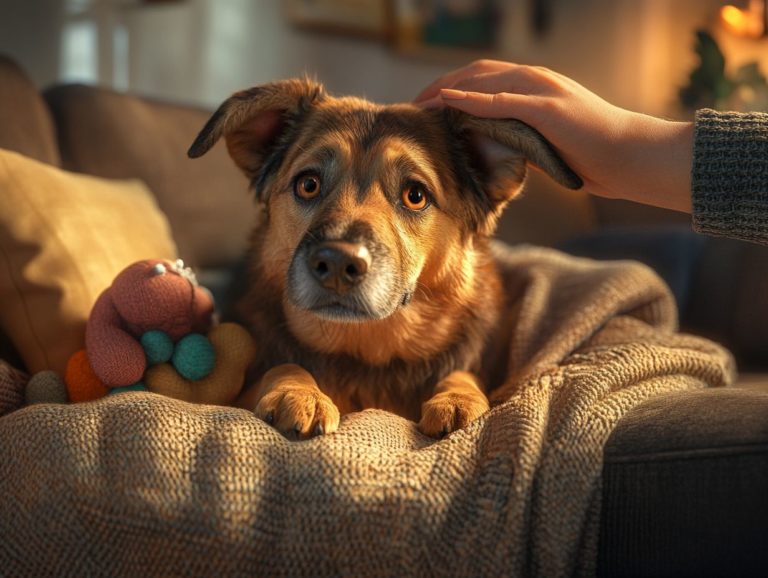The Importance of Mental Stimulation for Anxious Pets
Anxiety in pets is a pressing issue. It significantly affects their cognitive health and emotional well-being.
This condition can present itself in various ways, influencing your pet’s behavior and daily routines.
As a responsible pet owner, you might overlook subtle signs of anxiety. This can lead to a decline in your companion’s quality of life.
By understanding how anxiety impacts pets, you can adopt strategies that enhance their mental stimulation and provide a positive outlet for their energy. This ultimately improves their emotional needs and thinking skills.
Contents
- Key Takeaways:
- The Effects of Anxiety on Pets
- Signs of Anxiety in Pets
- The Role of Mental Stimulation for Anxious Pets
- Ways to Provide Mental Stimulation for Pets
- Tips for Implementing Mental Stimulation for Anxious Pets
- Working with a Professional
- Frequently Asked Questions
- What is the importance of mental stimulation for anxious pets?
- How does mental stimulation benefit anxious pets?
- What are some ways to mentally stimulate an anxious pet?
- Can mental stimulation replace medication for anxious pets?
- How often should an anxious pet be mentally stimulated?
- Are there any risks involved in mentally stimulating an anxious pet?
Key Takeaways:

- Mental stimulation is crucial for anxious pets as it helps to alleviate their symptoms and improve their overall well-being.
- Signs of anxiety in pets include changes in behavior, such as excessive chewing, pacing, and avoidance of certain activities or people.
- Providing mental stimulation for pets can be done through interactive toys and games, creating an enriching environment, and establishing a routine.
The Effects of Anxiety on Pets
Understanding how anxiety impacts your pets mental health is important for effective care. It directly affects their thinking skills and behavior.
Numerous studies reveal that anxiety can lead to significant behavior problems, such as aggression and withdrawal. This can compromise your pet s overall wellness.
For example, research published in the Journal of the American Veterinary Medical Association indicates that pets grappling with anxiety may face long-lasting problems with thinking and learning.
Each species, whether it s dogs or cats, has distinct emotional needs. While dogs thrive on social interaction and play, cats usually benefit from a structured environment that includes opportunities for exploration and safe hiding spots.
By addressing these specific needs, you can alleviate anxiety and cultivate a healthier mental state in your pets. This ultimately strengthens the bond you share.
Signs of Anxiety in Pets
Take action to spot the signs of anxiety early! Recognizing the signs of anxiety in your pets is essential for tackling behavior problems swiftly and effectively.
Your furry friends, especially dogs and cats, can display a range of symptoms, from subtle shifts in behavior to more obvious reactions like destructive tendencies and excessive barking.
By understanding these signs, you enable yourself to provide proper care and mental stimulation, which can include interactive toys and puzzle toys. This proactive approach reduces their stress and enhances their overall well-being.
Identifying Behavioral Changes
Identifying behavioral changes in your pets is crucial for spotting anxiety. These shifts often signal underlying stress or discomfort.
By closely observing your pet’s daily activities and interactions, you can catch subtle changes that might suggest anxiety like unexpected bursts of hyperactivity or withdrawal from play and socializing.
Look out for signs of boredom; they might reveal themselves through destructive chewing, excessive barking, or restlessness. Engaging regularly in training sessions and playtime deepens the bond you share with your pet and provides an opportunity to monitor these behaviors.
By staying attuned to your pet’s mood and routine, you’ll be in a better position to recognize when something s off and address it promptly.
Start today! Create a stimulating environment for your pet and watch them thrive!
The Role of Mental Stimulation for Anxious Pets
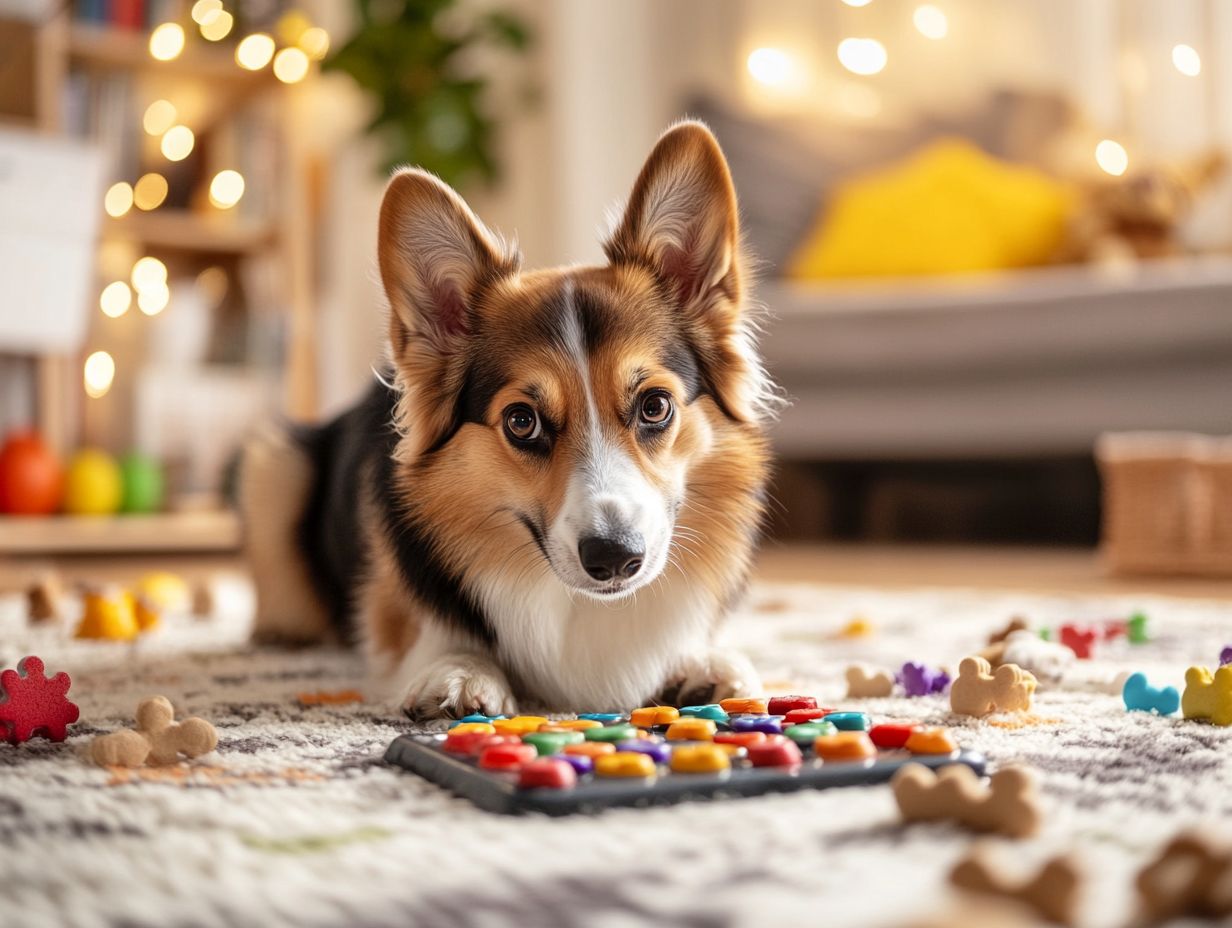
Mental stimulation is essential for enhancing the well-being of anxious pets. It addresses their mental health and fulfills their emotional needs. For pet owners, understanding the needs of anxious pets can be crucial. Engaging in fun activities can help alleviate stress and anxiety, leading to a noticeable improvement in their overall quality of life.
This approach fosters problem-solving skills and deepens the connection between you and your pet. This creates a more harmonious living environment.
How Mental Stimulation Can Help
Mental stimulation is crucial for your pets, especially for those dealing with anxiety. Understanding the importance of routine for anxious pets plays a vital role in reducing stress and enhancing their mental health.
Engaging your pets in various mental challenges, like interactive games and problem-solving activities, can significantly address their emotional needs. For example, puzzle toys that dispense treats compel your pets to think critically, offering a rewarding experience that sparks exploration.
Training sessions also nurture your pet’s mental and physical engagement. These activities reduce anxiety and enhance overall well-being, allowing your pets to feel more secure and content in their surroundings.
Ways to Provide Mental Stimulation for Pets
Providing mental stimulation is essential for combating boredom and anxiety. You have many effective strategies at your disposal, including the best toys for anxious pets and training sessions.
From interactive toys that challenge their cognitive abilities to daily enrichment activities that engage their senses, there are numerous ways to keep your pets mentally active.
As a responsible pet owner, implement techniques tailored to each pet’s unique needs. Whether you have a dog or a cat, ensure that every companion receives the mental stimulation they deserve.
Interactive Toys and Games
Interactive toys and games are exceptional tools for providing mental stimulation to your pets, particularly dogs and cats. They engage your pet’s cognitive functions and encourage problem-solving skills.
These innovative products come in various forms, such as puzzle feeders, treat-dispensing balls, and interactive plush toys. Each type is specifically designed to challenge their mental agility while keeping them entertained.
For instance, puzzle feeders require your pets to navigate a series of challenges to access treats. This promotes healthy eating habits and enhances their cognitive abilities.
These engaging games can be a boon for a wide range of pets, including rabbits and birds. They satisfy emotional needs and foster a stronger bond with you through enjoyable shared playtime.
Enriching Environments
Creating enriching environments is essential for promoting mental stimulation. It encourages pets to explore their surroundings.
This involves integrating a variety of activities designed for both dogs and other animals. Simple yet effective elements like interactive toys, puzzle feeders, and agility courses can ignite curiosity and inspire play.
Incorporating games that involve scent work or hidden treats offers substantial mental exercise, which is crucial for alleviating anxiety.
When animals are mentally stimulated, they display healthier behaviors, making them less susceptible to stress and destructive tendencies. Understanding positive reinforcement for anxious pets fosters a more harmonious relationship between them and their human companions.
Start engaging your pet today for a happier life!
Tips for Implementing Mental Stimulation for Anxious Pets
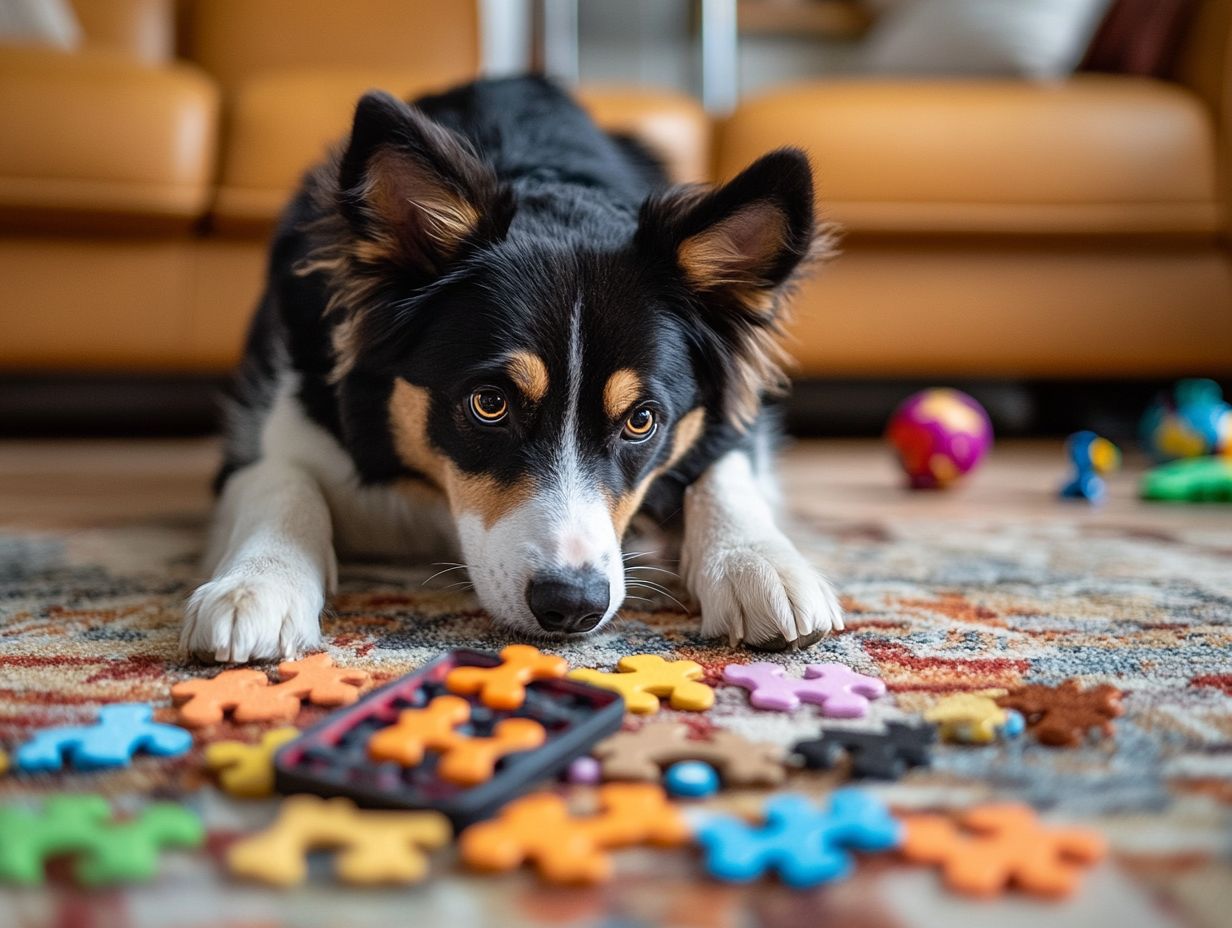
Implementing mental stimulation for anxious pets requires careful planning. Consider using games to alleviate pet anxiety by choosing techniques that meet their needs and improve their quality of life.
By establishing daily routines that incorporate mental exercises, you can significantly reduce anxiety levels and improve their emotional well-being.
It’s crucial to manage your expectations. Understand that each pet is unique and may respond differently to activities. This tailored approach not only nurtures their mental health but also strengthens the bond you share.
Creating a Routine
A daily routine with mental stimulation is key! It keeps your pets happy and helps prevent boredom and anxiety, especially in pet-friendly spaces like doggy daycare.
Incorporating daily activities such as interactive playtime, puzzle toys, and training sessions enhances your furry companions’ cognitive abilities while addressing their emotional needs.
Regular walks provide the physical exercise they need and expose them to new sights and sounds, enriching their sensory experiences.
Consistency in these routines is essential. A predictable environment helps pets thrive, reducing the chances of destructive behaviors stemming from restlessness. A well-rounded routine keeps your pets mentally engaged and cultivates stronger bonds between you and your beloved companions.
Managing Expectations
It’s crucial to manage your expectations. Understand that each pet is unique and may respond differently to activities.
Recognizing individual behaviors and preferences can greatly impact the effectiveness of mental stimulation techniques. For example, while one pet may thrive in interactive play sessions, another might find joy in puzzle toys or quieter activities that challenge their minds without overwhelming them.
By observing how your pet responds to different forms of mental stimulation, you can customize your approach. Offering a positive outlet for energy enriches your pet’s life and helps alleviate behavioral challenges, fostering a harmonious relationship between you and your furry companion.
Working with a Professional
Engaging with a professional, such as a veterinarian or a trainer, offers invaluable insights and strategies for effectively managing anxiety in your pets.
These experts can assist you in pinpointing specific behavioral challenges and crafting a mental stimulation plan that’s perfectly tailored to your animal companions.
Whether through training sessions or behavior checks, professionals play a pivotal role in enhancing your pet’s cognitive health and emotional well-being.
When to Seek Help from a Veterinarian or Trainer
Knowing when to enlist the expertise of a veterinarian or trainer is vital as you navigate the complexities of anxiety-related behavioral challenges in your furry companions.
Recognizing the signs of anxiety like excessive barking, destructive behavior, or withdrawal is crucial for taking timely action. If your dog consistently shows signs of nervousness during loud events such as thunderstorms or fireworks, it may indicate that their anxiety requires professional help.
Consulting a veterinarian can lead to a proper diagnosis and a range of treatment options, including medication or behavior modification therapy. Trainers can offer tailored strategies to help you gradually desensitize your pet to stressful situations, transforming anxiety into confidence through positive reinforcement and structured training techniques.
Frequently Asked Questions
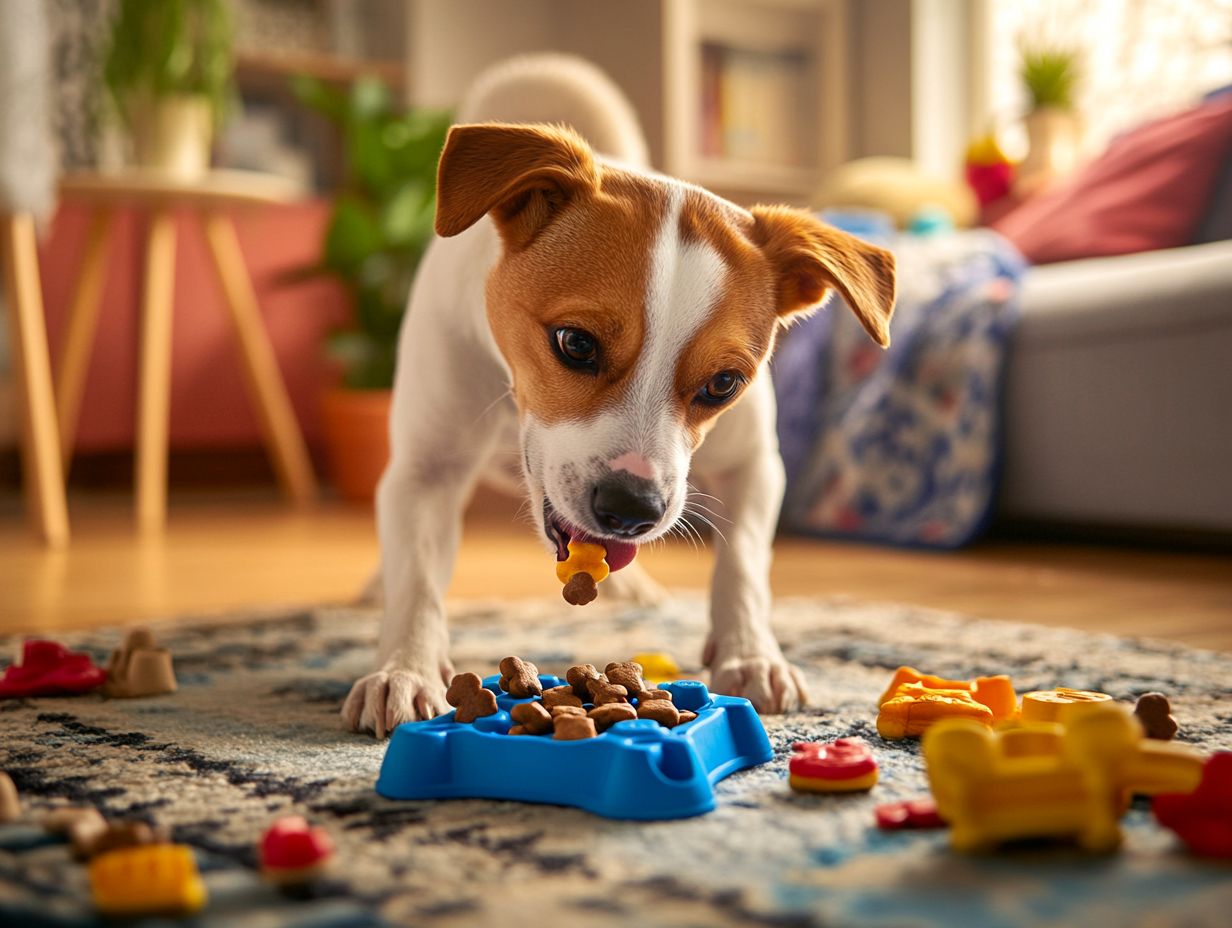
Explore the answers to your most pressing questions about pet anxiety!
What is the importance of mental stimulation for anxious pets?
Mental stimulation is crucial for anxious pets. It engages their minds and distracts them from anxious thoughts. Understanding the importance of socialization for anxious pets can lead to a calmer and happier state.
How does mental stimulation benefit anxious pets?
Mental stimulation gives anxious pets a sense of control. It reduces worrying behaviors and promotes positive actions, making it essential to explore understanding play therapy for anxious pets.
What are some ways to mentally stimulate an anxious pet?
Try interactive toys, puzzle games, or training exercises. Simple activities like hiding treats around the house can also keep them engaged.
Can mental stimulation replace medication for anxious pets?
Mental stimulation can help manage anxiety, but it is not a substitute for medication. For a comprehensive approach, it’s best to consult a veterinarian and consider the science behind training anxious pets for effective strategies.
How often should an anxious pet be mentally stimulated?
Daily mental stimulation is ideal, even in small doses, as it helps keep their minds busy and reduces anxious behaviors in pets.
Are there any risks involved in mentally stimulating an anxious pet?
Always keep an eye on how your pet reacts to activities. Stop anything that seems to increase their anxiety, and ensure they have a safe space to engage in mental exercises.


